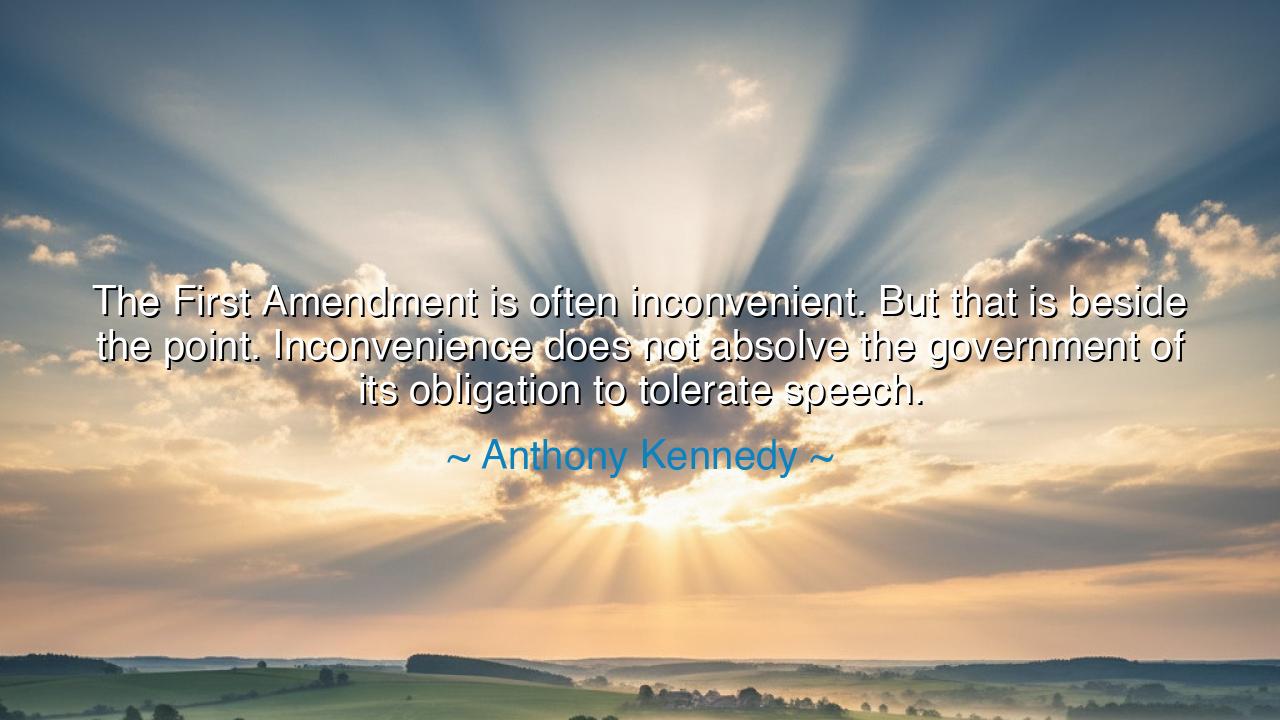
The First Amendment is often inconvenient. But that is beside the
The First Amendment is often inconvenient. But that is beside the point. Inconvenience does not absolve the government of its obligation to tolerate speech.






“The First Amendment is often inconvenient. But that is beside the point. Inconvenience does not absolve the government of its obligation to tolerate speech.” Thus spoke Justice Anthony Kennedy, a guardian of liberty and a voice of reason upon the bench of the Supreme Court of the United States. In these words, he reminds us that freedom of speech — that sacred flame of democracy — is not meant to comfort the powerful, nor to please the many. It is a covenant with truth, even when truth offends. His declaration stands as a timeless warning: that the inconvenience of liberty is the price of its preservation, and that a government which silences what it dislikes ceases to serve the people — it begins to rule them.
The origin of this quote lies within Justice Kennedy’s long defense of the First Amendment, the cornerstone of the American Constitution. Written in 1791, that Amendment proclaims that “Congress shall make no law… abridging the freedom of speech.” Yet through the centuries, governments have been tempted to forget its meaning, especially when the speech in question disturbs the peace, challenges authority, or provokes discomfort. Kennedy’s words, drawn from his judicial reasoning in the late 20th century, are a reaffirmation of that ancient promise — that free expression must stand even when it is unpopular, offensive, or unsettling. For the true test of freedom is not how we protect agreeable words, but how we protect those we despise.
To say that “the First Amendment is often inconvenient” is to acknowledge an eternal truth about liberty: that freedom is never easy. It demands patience, courage, and restraint from those who hold power. The cry of democracy is not “silence what offends me,” but “endure it, and answer it with reason.” In every age, the temptation arises to silence voices that stir unrest — to ban the radical, the dissenter, the artist, the protester. Yet Justice Kennedy reminds us that the purpose of the Constitution is not to make governing convenient, but to make tyranny impossible. A government’s “obligation to tolerate speech” is not a weakness; it is the measure of its strength, the proof that it fears not its people, but trusts them.
History bears witness to the peril of forgetting this. In the dark years of McCarthyism in the 1950s, the United States turned against its own citizens in a fever of suspicion. Artists, teachers, and thinkers were silenced under accusations of disloyalty; the fear of dissent nearly suffocated the freedom that defines the Republic. But as the nation awoke from that hysteria, it rediscovered the wisdom of its founders: that suppression of speech does not secure safety — it breeds ignorance and decay. In that rediscovery, the courts, guided by justices like Kennedy, reaffirmed that even the most inconvenient words are vital to the soul of the nation.
Consider, too, the example of Martin Luther King Jr., whose voice once shook the conscience of a divided America. His speeches disrupted comfort, his marches disobeyed unjust laws, and his words inflamed those who feared change. To the powerful, his message was indeed “inconvenient.” Yet it was through that very inconvenience that the nation found redemption. The freedom to speak allowed justice to rise. King’s life is the living embodiment of Kennedy’s truth — that the defense of speech must never depend upon its popularity, for today’s rebel may be tomorrow’s prophet.
But Kennedy’s insight reaches beyond the law; it is a mirror for every society and every age. In the modern world, where technology amplifies every voice and opinion, it is easy to call for censorship in the name of peace or decency. Yet to silence the unpleasant is to surrender to fear. The tolerance of speech, even when painful, is what keeps a society alive — for in the contest of ideas, truth is forged. As fire tempers steel, so does free debate temper wisdom. The measure of a nation’s maturity is not how it praises what is pleasant, but how it endures what is difficult.
Therefore, let us heed Kennedy’s wisdom. Let no citizen demand comfort at the expense of liberty. Let no ruler mistake convenience for justice. To preserve the First Amendment is to preserve the dignity of every mind, the freedom of every heart, and the strength of the Republic itself. The cost of freedom is patience; the reward of freedom is truth.
So remember, O listener: speech will always disturb; that is its nature. But a people who learn to live with disturbance grow strong, while those who seek only silence grow weak. For liberty is not found in agreement, but in endurance. The First Amendment is the voice of a free people — and to protect that voice, even when it shakes the air with discord, is to keep the light of democracy burning against the darkness of tyranny.






AAdministratorAdministrator
Welcome, honored guests. Please leave a comment, we will respond soon